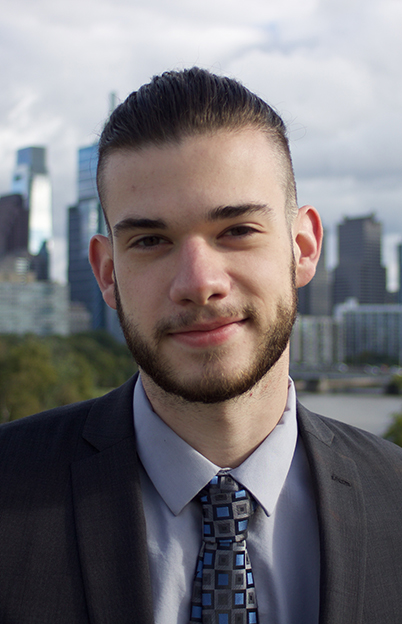
Please tell us a little about yourself.
I’m a junior physics major minoring in mathematics, computer science and data science. I’m originally from St. Pölten, Austria and came to Philadelphia in 2015. My research interests are rooted in computational particle physics. Next to physics and coding, I enjoy weightlifting and consider myself a fitness enthusiast. I also love travelling!
What’s your current research project? Please tell us about other research projects you were involved in.
I’ve been doing research in the computational side of particle physics since my first co-op sophomore year. I started off working with Professor Russell Neilson on PROSPECT, a reactor neutrino experiment, focusing mainly on detector calibration and simulation. For my second co-op I switched to Prof. Neilson’s other project, PICO, which is a dark matter direct detection experiment. With PICO I did data analysis and hardware work for our prototype bubble chamber here at Drexel. Currently I’m on my final co-op doing research at Michigan State University. Here I work with the IceCube group under Prof. Claudio Kopper. IceCube is a neutrino observatory on the south pole and my work is focused on applying machine learning techniques to event reconstruction.
Have you received any awards or scholarships while here at Drexel?
I’ve been on the Dean’s list every term and have received the Henry S.C. Chen Memorial Award, the Walter R. Coley Award and the M. Russell Wehr Physics Award from the College of Arts and Sciences. I was also awarded the Goldwater scholarship earlier this year and am part of the honors college.
Were you provided with opportunities to travel?
I was given the opportunity to travel to Sudbury, Canada to present our group’s progress at the 2018 PICO collaboration meeting during my second co-op. Additionally, I’m currently on co-op in Lansing, Michigan and just came back from this spring’s IceCube collaboration meeting in Madison, Wisconsin.
How was your co-op experience?
I’ve had a lot of extremely positive experiences with my co-ops, all of which were research based. I think what I like most with Drexel’s co-op system is the opportunity to try many different things. I did research with a different team for each of my co-ops and I think that gave me a very good overview of how particle physics research works on a broader scale. The research culture in physics is very welcoming and even though it might seem intimidating at first, people are always happy to help you out. I can definitely say that these experiences strengthened my aspiration to go to graduate school and pursue a PhD in the field!
What extracurricular activities are you involved with on campus?
I served as the vice president for Drexel’s NSCS (National Society of Collegiate Scholar’s) chapter for two years, where I helped organize student events and volunteering opportunities. Additionally, I was the vice president of Drexel’s German Club for a year.
What has made your experience at Drexel “special” or “unique?
Aside from the co-ops I think the city of Philadelphia is an important factor. Drexel’s location is just a walk (or subway ride) away from center city, which makes studying here extremely attractive. I love travelling and trying new things, so living in a major metropolitan area like Philadelphia is a huge plus to me! I also genuinely like the quarter system, because it gives us students the opportunity to take a larger variation of classes than a traditional semester school since our terms are only 10 weeks long. This has helped me realize my passion for coding by being able to take more computer science classes.
Why would you recommend the Physics program at Drexel to other prospective students?
The physics program here is very special to me because it’s an incredibly tight-knit community. Throughout my time here I’ve gotten to know almost all of the undergraduates and professors as well as a large number of graduate students. The professors in the physics department specifically are absolutely amazing, both as mentors and instructors.
What advice do you have for a high school student looking for an undergraduate program in physics?
If you get the opportunity, definitely talk to some professors. In my opinion the quality of the professors (as both instructors and mentors) will go a long way towards setting you up for your path after graduation. I’d also say there are huge benefits to applying to universities with a wide range of potential research so you won’t be stuck in a field you’re not passionate about if you plan on getting involved. Outside of that I’d advise every freshman to try to achieve a good work-life balance. College can feel somewhat overwhelming at times, but it’s important to step back every now and then and enjoy the amazing social opportunities it has to offer!